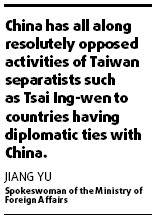Society
Island opposition leader may issue cross-Straits plan
By Li Xiaokun and Xie Yu (China Daily)
Updated: 2009-12-09 07:47
Tsai Ing-wen, Taiwan's main opposition leader, is likely to shift from the party's usually transparent anti-mainland stance and propose an historical cross-Straits strategy during her visit to Japan next week, mainland experts have said.

Despite the likelihood of Tsai's new strategy, the Foreign Ministry Tuesday said it was in clear opposition to Tsai's visit to Japan.
"China has all along resolutely opposed activities of Taiwan separatists such as Tsai Ing-wen to countries having diplomatic ties with China," said ministry spokeswoman Jiang Yu.
The move is part of the DPP's efforts to replace the ruling Kuomintang Party (KMT) in the 2012 election, Jiang said.
Tsai, the chairwoman of Taiwan's Democratic Progressive Party (DPP), announced on Tuesday that she would visit Japan next week.
DPP spokesman Tsai Chi-chang has said Tsai Ing-wen will raise issues ranging from cross-Straits relations, the economy, social welfare and environment protection during her visit from Dec 13-16.
The visit comes on the heels of the recent wrapup of Taiwan's local elections. According to local newspaper United Daily News, Tsai's popularity grew dramatically by 18 percentage points to 43 percent with her party gaining key victories by a slight margin.
The island's leader Ma Ying-jeou, chairman of the ruling KMT, stood at 33 percent, a major drop from his 52 percent approval rating in May.
Jin Canrong, deputy dean of the International Studies School at Renmin University of China, said Tsai is likely to express her cross-Straits relations ideas for the first time during the Japan visit.
Tsai took office as the DPP chairperson on May 20 of last year, the same day that Ma was inaugurated as Taiwan's leader.
"We can tell from the changes in Taiwan's political scene since 2008 that, like people in other parts of the world, the Taiwan people want a responsible and competing leader. Even if Tsai replaces Ma in 2012, I don't think she will follow the disruptive and irrational way of Chen Shui-bian in mainland policies," Jin said.
"This is a irreversible trend. And as the DPP said Tsai will raise the (cross-Straits) issue in Japan, she will highly likely do so this time."
Tsai's visit is not to push for relations with the mainland but for brighter political prospects for her and the DPP, especially after relations with Washington soured, Jin said.
"The DPP was quite unsatisfied with the joint statement the US issued with China during Obama's tour to China. Tsai quarreled with American Institute in Taiwan Chairman Raymond Burghardt, unofficial US envoy to Taiwan," he said.
Jin said that the DPP attaches more importance to Japan, a longtime supporter of Taiwan separatists.
But Jin also noted that Tokyo would receive Tsai in its traditional low-profile fashion to avoid irritating Beijing, especially after Prime Minister Yukio Hatoyama recently and repeatedly emphasized the importance of China.
Chen Xiancai, a researcher at the Taiwan Studies Center in Xiamen University, said Tsai also wants the visit to show Taiwanese people that she has the ability to mend Taiwan's ties with Japan that soured after the resignation of Masaki Saito, Japan's former unofficial representative to Taiwan. Saito irritated the KMT in May for comments on Taiwan's status.
Japan has designated a new de facto envoy, a former ambassador to Israel and Malaysia, to Taiwan. But China Times said the new envoy's inexperience in dealing with cross-Straits affairs as well as his lack of language skills could be a sign of Japan's displeasure at Saito's forced departure.
Wu Nengyuan, director of the Institute of Taiwan Studies at the Fujian Academy of Social Sciences, said Tsai's visit at this time is to seek Japan's support.
Despite the mounting pressure from the DPP, Jin Canrong said Ma Ying-jeou is unlikely to change his mainland-friendly policy.
"In Ma's one and half years in position as the Taiwan leader, improved ties with Beijing is the only point that glorifies him. I don't think he will reshape the policy as he has no other cards to play," Jin said.











